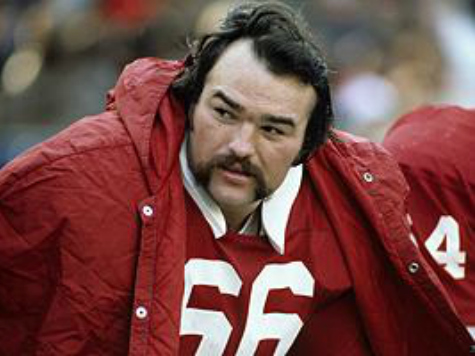
Conrad Dobler was Richie Incognito before Richie Incognito. Dubbed “Pro Football’s Dirtiest Player” on the cover of Sports Illustrated in 1977, the St. Louis Cardinals guard intimidated massive defensive linemen and, if you can believe his enraged opponents, clawed, eye-gouged, spit, and bit his way to protecting the likes of Jim Hart and Archie Manning.
So it was only natural that Breitbart Sports reached out to Dobler to hear his take on L’affaire Incognito, NFL Commissioner Roger Goodell requiring psychiatric evaluations of the linemen involved, and whether the game or America has grown soft.
“Everybody that plays football has to be a little bit crazy to begin with,” Dobler reacts to Goodell’s Monday-announced edict requiring Incognito, John Jerry, and Mike Pouncey undergo medical evaluations before they play this season. “I have a tough time thinking that a psychiatrist who has not played in a pugilistic sport like football can make an intelligent decision on the mental makeup of the individual who does participate in those activities. They work on what the average of society is. Those 1,600 guys aren’t the average.”
Dobler doesn’t think the locker room has changed much in the three decades since he last played. He believes the surrounding culture has. “The world has gotten so antiseptic about everything,” the ten-year NFL veteran offers. “Back when we played stuff like that happened all the time. I think it was just a situation where they were just ribbing him and it went too far and he just snapped.”
He sees enough blame to go around in the Incognito-Martin scandal. “I think [Martin] just got his nose out of joint,” Dobler maintains. “He got the rest of the year off and got paid, didn’t he? Not a bad job, huh? There might be two sides to this story but no one’s ever looked at the other side.” On the other hand, Incognito’s antics–particularly those displayed in a shirtless, ranting, barroom YouTube clip–prompt Dobler to sense that chemicals may have fueled his misbehavior. “Maybe he does need something more so than mental health. Maybe he needs to go into detox.”
Dobler expressed particular outrage over Incognito invoking Martin’s mother and sister in his insults. “You can bust someone’s balls in the locker room,” the three-time Pro Bowl selection holds. “But wives, children, family–that’s off the table. Family’s off the table.”
“I put up with the worst possible situation,” he recalls of his rookie-year initiation. “You lost your game plan and it was $500 bucks. [Dan] Dierdorf and Tom Banks would steal my game plan.” As a fifth-round pick making $17,000 in 1972, Dobler remembers the fines taking a toll on his wallet. Teammates would routinely tell him the wrong snap count. He recalls not only coaches taking part in ritualistic rookie ribbing, but ownership, too. When the Polish population of his native Chicago mounted a postcard campaign to win Dobler more playing time, the 4,000-missive-strong lobbying campaign backfired on the rookie lineman. “The owners took all those postcards,” Dobler remembers. “They [teammates] dumped them in my locker. Of course, I had to take abuse for that. Everybody in the clubhouse has got one.”
How did Dobler stop the torment? After rejoining the team after a release, he consciously changed his attitude. “I fought everybody every single day,” the guard recalls. “I fought a guy on my team every single day on the field.” The practice-field fisticuffs occurred in pads and ceased once the combatants stepped past the sidelines. But it earned Dobler the respect of his teammates and relief from abuse. “I was pissing on my fence post,” he remembers of the territory surrounding the quarterback. “This is my area.” Though adversaries Mean Joe Greene and Merlin Olsen may have objected, teammates generally took the rough play in stride. The physical altercations rarely invaded the Cardinal locker room. “Don’t take that stuff personal. It’s just the way it is out on the field. It’s not like I’m going to go out in the parking lot and roll with you. I’d rather have a beer with you.”
Dobler notes that he takes no pride in his reputation as a dirty player. Instead, he revels in the fact that the offensive lines that he played with often held defenses to fewer quarterback sacks than the other lines in the league. In 1975, for instance, the St. Louis Cardinals line allowed just eight sacks. Number 66 proudly points out that one such sack occurred on a muffed kick attempt.
If the mentality of offensive linemen hasn’t evolved much in the decades since Dobler retired after the 1981 season, the mentality of the spectators has changed dramatically, he says. “Everyone has to be politically correct and everyone wants to tell everyone how to live their lives,” Dobler maintains. “Obama tried to make the country politically correct and there’s not a country in the world that’s afraid of us anymore. Now, when you had Reagan in there the world was afraid of us. And that’s part of professional football: winning through intimidation is part of it. Your job is to win the battle on the line.”

COMMENTS
Please let us know if you're having issues with commenting.